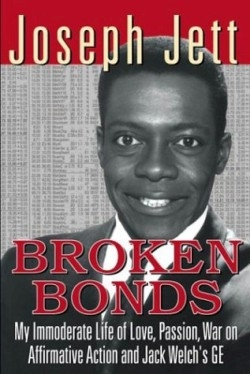Broken Bonds
My Immoderate Life of Love Passion War on Affirmative Action and Jack Welch's GE
An immoderate life, indeed! It would be inconceivable for readers to expect anything else from the author, who was accused in 1994-and then cleared-of single-handedly defrauding a General Electric subsidiary, Kidder Peabody, of more than $357 million. This man, who earned two degrees from MIT and a MBA from Harvard, went on to become a Wall Street success story, with extraordinary ambition, intelligence, and sheer determination.
A self-described warrior, Jett didn’t blink when he went up against corporate behemoth General Electric and its chief executive officer, Jack Welch. He attacked Affirmative Action as morally bankrupt. The story of his “immoderate life” is even more compelling when one considers that Joseph Jett is African-American.
Jett recalls his experiences as a student at Harvard Business School, his early climb up the corporate ladder, and the sequence of events that led to the fraud charges leveled against him by General Electric and the Securities and Exchange Commission.
Both critics and proponents of Affirmative Action will find Jett’s point of view on the issue compelling. He characterizes the Affirmative Action policy as “the white man’s tool to discredit … [the] intellectual ability” of blacks. In order to disprove a white colleague’s belief that because of Affirmative Action Jett would be accepted to prestigious academic institutions for reasons other than merit, he had erased all signs of his race from applications to MIT and Harvard.
This book is not for the faint of heart. Jett makes it clear from the very beginning that he plans here to set the record straight about his rise and fall. Now, more than seven years after he was cleared of all charges against him, Jett uses this book as an opportunity to confront the perceived injustices against him in particular and African Americans in general. It is clear that he views Affirmative Action as the greatest injustice of all.
Jett, in vivid detail and with great flourish, describes his climb up the corporate ladder: first at Morgan-Stanley, then First Boston, and later at Kidder, Peabody. He states that he picked a career on Wall Street because “the only thing that mattered at the end of the day was how much money you made.” At least, that was what he thought when he worked as a head trader on the Fixed Income Government Bond desk at Kidder, Peabody. It soon became apparent that he was not being treated as fairly and equitably as he expected, and that some of his superiors were more concerned with “black male sexuality” and his relations with white women than with his performance on the bond desk.
Jett goes into some detail about his romantic and intimate encounters in places as far-flung as Thailand, Marrakech, and Rio de Janeiro, which, at times, seem too forthcoming and indiscreet for someone who thinks of himself as a disciplined, focused, and hard-charging “warrior.” Yet, these revelations also serve to put a human face on the self-reliant aesthete, who learned, albeit slowly, to adopt “the white man’s virtues and not his vices.”
As the Wall Street scandal erupted, Jett quickly found out that the professional career he spent years building was beginning to crumble. Even those colleagues who had earlier stood by him deserted or turned against him, out of fear for their own careers and livelihoods. His account of the months that led to his downfall at Kidder, Peabody is gripping and dramatic.
With obvious delight and feverish zeal, Jett recounts his stand, toe-to-toe, against General Electric, and the downward slide of Jack Welch as the darling of Wall Street and the media. It is apparent that Jett perceived the subsequent trial and the efforts to clear his name as a moral crusade-an opportunity to affirm his “vitality, strength, and honor.” He states: “The might of the largest corporation on the earth could not destroy one Black man standing virtually alone.” Overall, this book offers an engaging, unflinching, and fast-paced account of life on Wall Street and a cautionary tale of what happens when power, money, ambition, greed, and race intersect.
Jett spent his life trying to prove that merit alone would enable him to succeed in corporate America. Yet, in the end, he discovered that despite the significant strides made by African Americans in all walks of life, and despite the American ideology, which states that merit trumps color, race still matters.
Reviewed by
Robin Dasher-Alston
Disclosure: This article is not an endorsement, but a review. The publisher of this book provided free copies of the book to have their book reviewed by a professional reviewer. No fee was paid by the publisher for this review. Foreword Reviews only recommends books that we love. Foreword Magazine, Inc. is disclosing this in accordance with the Federal Trade Commission’s 16 CFR, Part 255.

